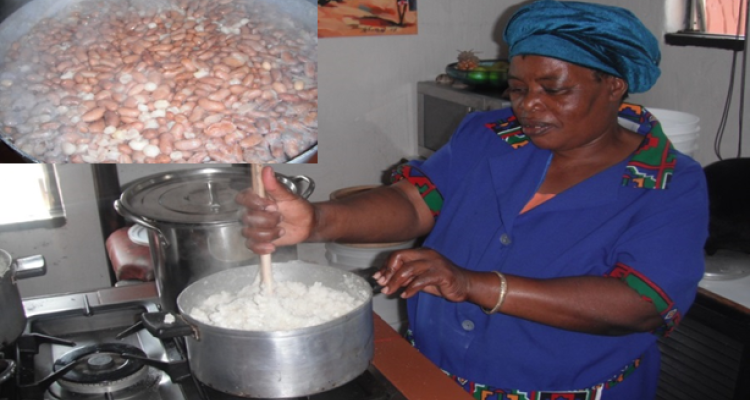
Press release
African diet reduces risk of intestinal cancer in Afro-Americans
Eating patterns have a direct effect on the gut bacterial composition and thus on the risk of developing intestinal cancer. These are the conclusions from an interdisciplinary study described in Nature Communications. Americans of African origin followed an African diet for 14 days. Conversely, Africans consumed characteristically American foods for the same length of time. Microbiologists from Wageningen University took part in this study, which was led by the University of Pittsburgh.
Photo: Stephen O’Keefe
Black South Africans hardly ever develop colon cancer, yet Americans of African origin have the highest incidence of this cancer in the whole American population. The diets of the two groups differ enormously. That of Africans in South Africa is rich in fibre and contains proportionately fewer proteins and fats. The Afro-American diet, on the other hand, contains little dietary fibre, but larger amounts of proteins and fats. There are also big differences in the methods of preparing food and this is often quoted as a reason for the difference in rates of intestinal cancer.
African and American diets
The international research team investigated what would happen if Africans received a typically American diet for 14 days, and vice versa. When the Africans consumed an American diet, they had higher levels of certain biomarkers that show an increased intestinal cancer risk. The converse also occurred; biomarker levels dropped in the Americans after they followed an African diet.
The traditional African diet consisted mainly of boiled foods, fruit and maize products including fish tacos, bean soup, salmon rissoles, maize tortillas and pineapples. The American menu featured a lot of fried products and red meat: pancakes, roast beef, fried liver and onions, and corned beef with potatoes.
There are big natural differences between the two groups, for example, regarding the composition of the intestinal bacteria and concentration of fermentation products such as short chain fatty acids. The researchers noticed that, in both groups, a change in diet had a big effect on the bacteria and metabolites (products of metabolism) which are regarded as risk factors for developing intestinal cancer. Consumption of the African diet resulted in more carbohydrate fermentation , which includes production ofmore butyrate, which reduces the risk of intestinal cancer. At the same time the intestinal bacterial networks change in composition. Another example: the production of secondary bile salts, which arise as a result of bacterial conversion of primary bile salts and which increase the risk of cancer, decreases after consumption of the African diet. The American diet has the opposite effect.
The research was the result of international collaboration coordinated by Professor Stephen O’Keefe from the University of Pittsburgh, with researchers from Wageningen University, University of Illinois at Urbana-Champaign, Imperial College London, University of Helsinki and University of KwaZulu-Natal. In Wageningen, Erwin Zoetendal of the Laboratory of Microbiology was responsible for the microbiological work. He had not expected these results: “It really was surprising to see such a large effect after only two weeks of a change in diet.”Willem de Vos, chair holder of the Laboratory of Microbiology, was also involved in the research and commented: “This pioneering study in particularly interesting populations has shown that diet-driven changes in the microbiome can have a direct effect on risk factors for colon cancer.”
Publication
“Fat, fiber and cancer risk in African Americans and rural Africans”, Nature Communications, 28 April 2015. Stephen J.D. O’Keefe, Jia V. Li2, Leo Lahti, Junhai Ou, Franck Carbonero, Khaled Mohammed, Joram M. Posma, James Kinross, Elaine Wahl, Elizabeth Ruder, Kishore Vipperla, Vasudevan Naidoo, Lungile Mtshali, Sebastian Tims, Philippe G.B. Puylaert, James DeLany, Alyssa Krasinskas, Ann C. Benefiel, Hatem O. Kaseb, Keith Newton, Jeremy K. Nicholson, Willem M. de Vos, H. Rex Gaskins & Erwin G. Zoetendal.